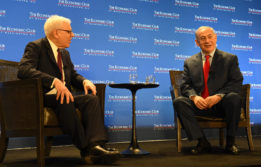
PM Netanyahu and The Economic Club of Washington Pres. David M. Rubenstein. Photo courtesy of Haim Zach / GPO
Israeli Prime Minister Benjamin Netanyahu on Wednesday said he is witnessing something he’s never seen in his entire life. It’s something that he sees as “a new hope on the horizon,” something offering the potential for real Middle East peace, and as he said, “it’s not related to the Palestinians.”
“Because of the growing danger of Iran, more and more, I would say virtually all the Arab countries, no longer see Israel as their enemy, but as their vital ally in countering the threat of militant Islam,” said Netanyahu in a visit to the Economic Club of Washington according to comments published by his office.
Netanyahu noted they have stopped ISIS terror attacks, including those targeting “big airlines” and that counterterrorism includes sharing intelligence with Arabs. And then there’s the threat of Iran, and the uniting of the Israeli and Arab efforts against them. “Out of this curse comes a blessing. The blessing is this extraordinary relationship between us, and I think that ultimately we might be able to shift the ground,” said Netanyahu. “I don’t think it’s really available right now but I don’t discount that it could happen.”
While the goal of a bright future isn’t focused on the Palestinians, Netanyahu believes it can bring about the ultimate change in the Palestinian relationship with Israel. “We used to say that if we make peace with the Palestinians we’ll break out and normalize our relations with the Arab world. I think it actually may work more the other way around. We normalize our relations with the Arab world to help change the perception of the Palestinians.”
That could be the only way peace with the Palestinians is achieved, given where things stand now. The Palestinians haven’t even officially negotiated with Israel in years and their supposedly-moderate leader recently spouted a torrent of anti-Israel conspiracy theories and refuses to let the United States act as mediator any longer.
The hard line taken by the Palestinians has Netanyahu believing the only hope for lasting peace is for Israel to maintain security control even after a Palestinian state is formed. He noted that Israel should maintain military and security responsibility for the entire area west of the Jordan River, including territory claimed by the Palestinians.
The alternative, Netanyahu warned, is another Gaza—where Israel left and the terrorists in Hamas took over—or Lebanon, where Israel left and the terrorists in Hezbollah took over. He said that if Israel leaves most of Judea and Samaria—also known as the West Bank—then either Iran via Hamas or ISIS would step in. He called that a “catastrophe for peace.”
“I think most Israelis would favor a situation where we could separate from the Palestinians. I don’t want the Palestinians as citizens of Israel and I don’t want them as subjects of Israel. So I want a solution when they have all the powers they need to govern themselves, but none of the powers that would threaten us,” said Netanyahu.
“…Does that comfort with full sovereignty? I don’t know. But it’s what we need to live. And in this area, the Middle East, full of failed states, states that collapsed, it’s very important that Israel be the power responsible for security because otherwise everyone collapses. The Palestinians collapse.”
His comments implied that the old, true “two-state solution” model of a fully independent Palestine just isn’t realistic in the violent region of today. And the Palestinians are making it worse, not better. He said the Palestinians are “convinced more and more that they want a state instead of Israel. And that’s not a real peace. People would go for a real peace, not a fake one.”
In the meantime, there’s hope for something approaching peace with the other neighbors in the region, and maybe someday a real peace with the Palestinians will emerge from that too.
(By Joshua Spurlock, www.themideastupdate.com, March 7, 2018)
